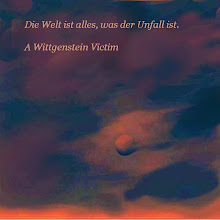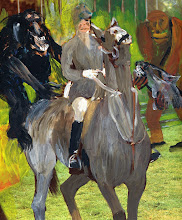Interpretation of Mask on Cross
A: Why is it so hard to fix a soul?
B: The soul is in constant fluttering movement between the heavenly forces which pull it upwards and those animal ones that pull it downwards. The four winds are alone capable of holding it still when they all converge in exact equal velocity upon the soul as their centre.
A: Does the mask fit in its frame of four red waxed bars like the soul held fast by four equal winds?
B: Yes. The artist has created a replica of this suspension. The heavenly forces are completely balanced by the animal forces. So the masks could be the souls of heroes or demons. For only in them are the animal and heavenly powers in exact equivalence.
Forbidden Scenes
A: When one has looked at something one should rather have not looked at, or which it was dangerous to look at, or both and for too long, but one has to record it somehow, even if this was all in a face which has been seen by many others as well but to whom this sight was not revealed, how could anyone judge if what is in the face is in the image and the other way around as well.
B: When reporting forbidden scenes or sights one must strictly confine oneself to talking about what one sees and not about what one feels.
Only by observing this rule will you avoid being yourself harmed by what you see. But if you keep to this rule you can report freely all that you see – without the need to omit anything.
“Don’t look at yourself and inherit freedom” (Hafis)
A: What about not thinking about what you see?
Should one confine oneself to thinking about all things besides what you are seeing?
B: The mind moves from the seen to the unseen says Emerson. Meaning the mind moves in on itself. It is unseen. The workings of the mind are unseen.
A: But surely they are capable of being manifested?
B: But that which is manifested is not in the mind. Whatever it is which is seen only gives vague testimony that a mind had once worked there.
“The things which I have seen I now can see no more.”
A: That’s Wordsworth isn’t it?
“Intimations of Immortality from Recollections of Early Childhood”
B: It certainly is. Unseen does not mean secret. A secret could be revealed. The perpetual unseen abolishes the drama of betrayal.
A: I suppose that something by nature unseen could not become a forbidden scene . One needn’t worry about looking at it either.
B: Forbidden scenes aren’t necessarily hidden. They are mostly there long before one has a chance to prepare for them. One should never expect a forbidden scene to obligingly keep itself out of sight. One should on the contrary expect it always to appear, at any moment. Just like any apparition should always be expected. This is not a unique quality of forbidden scenes. It’s the law of the universe – nothing which is susceptible to being seen can ever hide, nothing can ever be hidden. In particular errors.
A: When one corrects an error can’t it be said then to be hidden?
B: Then especially not. The error has become enshrined in the correction. Even if the error were by nature unseen, its correction would always be seen. By the same token, there is no such thing as a virgin soul.
A: Why not?
B: Because if a soul were here for the first time, it could logically also be here for the last time. But that’s impossible. Nothing is last under the sun.
Concentration
B: Reduction is the anti-nature, the principle of art. Art reduces the absolute quantity of existence. Art is a great reducer. That which is natural adds and multiplies, the unnatural subtracts and divides. This is the origin of concentration.
A: But what about natural selection? Isn’t that a natural principle of reduction?
B: Natural selection refers to the variety of means by which nature meaning species multiplies itself. The generative principle is nowhere contradicted by the principle of natural and sexual selection. It’s as creationist as anything in nature.
A: To create is natural, human.
B: To destroy is unnatural, divine. To concentrate is more than human, not divine but artistic.
A: But doesn’t the artist create anything at all?
B: Yes. But not on purpose. Mostly danger, shame, and dishonour for himself. He doesn’t need much.
A: Give me an example of this concentration.
B: Look at the lamp hanging in front .
A: I’m looking.
B: What does it look like?
A: Like a house.
B: You know what it’s called?
A: Yes. Socrates’ friends.
B: Is it very big?
A: No. It’s quite small.
B: Why is it so small?
A: Because Socrates built it for his friends.
B: Was it big enough for his friends?
A: It was. It got bigger and bigger. It was too big in the end.
B: You see. You’ve given me an example of concentration yourself. Need I say more?
A: What does this concentration look like?
B: In the morning everything looks hopeful and restless, in the evening despairing and concentrated. That is the true face of concentration. Despair looks concentrated. Or concentration unveils itself in despair. One cannot despair without being concentrated about it or concentrating on it.
One cannot be hopeful without feeling restless. When one is restless however one is unable to concentrate. And soon loses the very grounds for hopefulness. And so runs the cycle between hope – restlessness or movement – inability to concentrate –despair – ability to concentrate on one’s despair – generation of new hopefulness.
A: What exactly does art reduce?
B: Primarily emotions, sensations and secondarily actions. Superior art displaces great quantities of motions, sensations and emotions, all entities whose being is lodged in the temporal and spatial occlusions.
Inferior art injects vast amounts of sensations, emotions and motions into an already surfeited field, magnifying the animal outreach.
A: Is superior art more powerful?
B: Only to the degree to which it has become pure spiritual law and has no being nor idea lingering in the temporal and spatial occlusions.
A: When does that happen?
B: Actually, never, but the greater the art, the more longing it engenders for what will never be.
A: So art does create something. It creates longing.
B: You are right. But longing is a formless negative attribute of the mind. It is the power in any individual that causes him to set off on a heated restless erratic pursuit of oblivion. The power does not move itself. That is what one commonly calls love. The auto-violent engine. Once started up, it fires itself until the body of fuel has been completely turned into heat and light and all motion ceases.
“My longing is so hot
That I readily catch fire
In contemplation of
The noble object, for whose sake
Fiercely burning
I shower sparks from my embers
Upon the stars.
No moment in all the years
Which would have seen my
mute signs show any change.”
(Giordano Bruno, Of the Heroic Passions)
A: Aren’t there any other people besides artists whose livelihood depends on reduction in a similar fashion?
B: A few. Very few.
A: Give me an example. Something familiar, closer to home.
B: It’s not really the same. But if you insist. Anyone involved in horse racing. Especially in the steeplechase.
A: What do you mean?
B: I knew you would ask that.
A: People betting on horses want to win so that they can multiply their fortunes. Even if they lose, betting itself goes on.
B: True. I don’t mean gamblers. They are creationist. I’m referring to the jockeys and their horses, to a significantly lesser degree to their breeders, trainers, owners, stable lads, etc.
Stable lads have half formed sinful faces. But they don’t depend on them staying like that. When full grown they can still move around with the horses in their trailers at night. But the jockeys have to stay small. If a jockey can’t stay small he will soon be a dead jockey. Growth in the jockey is a slow cause of death. That’s what happened to the greatest jockey of all times – Fred Archer. He grew bigger and put on weight. He went on a strict diet; sometimes his intake was restricted to castor oil and orange juice.
But nothing he did reduced his size back to where it was originally.
The diet itself wore his nerves out. He couldn’t stay light. Eventually he had to shoot himself. A martyr to his metabolic rate. He was twenty nine years old and undefeated.
A: It seems to me he didn’t really succeed in his reduction. He was dependent on being born reduced. As soon as he had to reduce himself, his life turned into a disaster.
B: You have just proved beyond a shadow of a doubt that the force needed to withstand a natural drive, in other words, a force of reduction, cannot be identical with that same natural drive, quite simply because it is the force and the only force opposing it, hence the anti-drive or reductive force must be unnatural.
A: Do you mean if the drive is natural, the anti-drive is unnatural?
B: I do.
A: Which is greater?
B: The natural drive is by far greater but infinitely common. The unnatural anti-drive is weak but exceedingly rare. Seneca would have one believe that something which is a common property, in this case, the natural drive, is not less valuable just because it is common.
Similarly, the older virtues are not more virtuous because they’re older, hence Jupiter cannot be considered more virtuous than a mortal.
A: You haven’t said anything about the horses. How do they exemplify the unnatural force of reduction?
B: The race horse, in particular the one which is ridden in a steeplechase, can be said to be racing on his own death.
A: Do you mean his legs are his death?
B: Very good. You have an intuitive grasp of the tragedy of the race horse.
A: Yes I think I do. The horse’s legs carry him to victory, they are his means of locomotion, they are what make him great. But they make him fall as well. When he breaks his leg in a fall, he will be put down. No matter how great a champion he was until that moment.
The legs of a race horse are a bridge. On the one side is his life and on the other side is his death.
B: “Let him who is a chief be a bridge. “ (Branwen Daughter of Llŷr, The Mabinogion)
A: But it is a bridge for one. When he has crossed it, one time, the bridge will have served its purpose.
When his legs stand, all stands, when his legs fall, all falls. That is quite reduced, I agree.
Enough said.
B: Not quite. All does not fall. The tragedy is completed. There would be no tragedy without a sacrifice.
A: Is a sacrifice a reduction?
B: Yes. There are always sacrifices made before any tragedy. The Greeks sacrificed to Poseidon before the horses and chariot races. The sacrifices before the event signify that a sacrifice during the event is expected, even desired.
A: Is that why all the noses of all the masks are broken?
B: Yes. The noses of the masks have been sacrificed in advance of the race. The twelve masks are Odin’s jockeys riding Odin’s horses in Odin’s race.
“Dedicated to Odin, I to myself” (words of Odin, in Edda)
A: Is the red wax their blood?
B: No. It is Kvasir’s blood.

.jpg)
.jpg)
.jpg)
.jpg)
+.jpg)















.jpg)













